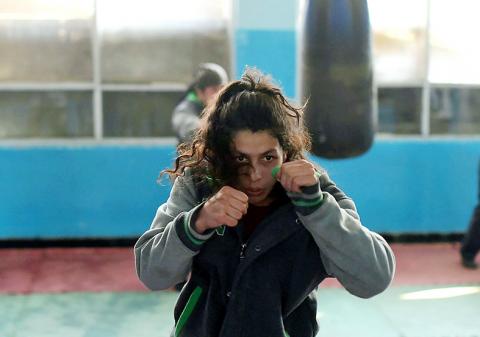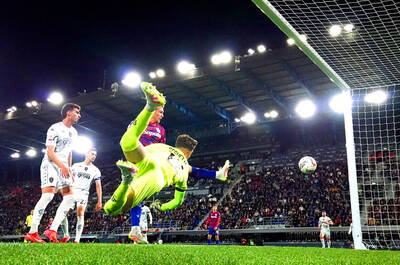Nineteen-year-old Afghan boxer Sadaf Rahimi slams her punching bag deep in the bowels of Kabul’s Ghazi Stadium, dealing blows to gender stereotyping and doing her part to to exorcise history: It was on these very grounds that the Taliban carried out public executions.
Sadaf, whose shy gaze seems at odds with her muscular 60kg frame, pulls on her gloves. A liberating spasm accompanies each blow that crushes the leather mitts of trainer Agha Gul Alamyar.
Sadaf is a brilliant boxer, but she is also an exception in a conservative Muslim country where women participating in sport is taboo.

Photo: AFP
At all of 19 years of age — seven of which she has spent in the ring — Sadaf sees a moral obligation “to prove that men and women can be equal. Girls are not forced to stay at home.”
Born to a middle-class family from the Tajik ethnic group, Sadaf had to first make the case for boxing — which she discovered by watching Mike Tyson and Laila Ali on TV — to those closest to her.
“At first my family was opposed to me boxing. They were saying: ‘Why is a girl boxing? She should stay home, do the chores and cook.’ My aunt is still against it,” says the young woman, who is also pursuing a degree in economics.
She is taking a stand on misogyny and against the darkest hours of Afghan history, by training inside Ghazi stadium, which the Taliban used for their public executions during their 1996 to 2001 regime.
Like other young women, Sadaf has to contend with poor equipment and basic infrastructure. The mats are threadbare and the gloves and punching bags are old and worn out.
The federation currently counts only 20 women in its ranks.
To boost the sport among women, Sadaf wants to set up her own club and become a trainer, but first she must mount the podium in international competitions, a distant dream. She has brought home three bronze medals in regional competitions, but is not yet up to Olympic standard — the sport’s Holy Grail.
In 2012, Sadaf lied to accept an invitation by the Olympics organizer, but the International Boxing Association eventually did not allow her to leave for London, fearing her better-trained opponents could seriously injure her.
And this year, she will not be going to Rio. This time around the reasons are more prosaic — her defeat in the South Asian Games in India in the middle of last month means she will not be Olympics bound.
“I am disappointed,” she said. “In India, I was completely alone. No trainer came with me, I had no support at all.”

Bologna on Thursday advanced past Empoli to reach their first Coppa Italia final in more than half a century. Thijs Dallinga’s 87th-minute header earned Bologna a 2-1 win and his side advanced 5-1 on aggregate. Giovanni Fabbian opened the scoring for Bologna with a header seven minutes in. Then Viktor Kovalenko equalized for Empoli in the 30th minute by turning in a rebound to finish off a counterattack. Bologna won the first leg 3-0. In the May 14 final in Rome, Bologna are to face AC Milan, who eliminated city rivals Inter 4-1 on aggregate following a 3-0 win on Wednesday. Bologna last reached the

If the Wild finally break through and win their first playoff series in a decade, Minnesota’s top line likely will be the reason. They were all over the Golden Knights through the first two games of their NHL Western Conference quarter-finals series, which was 1-1 going back to Minnesota for Game 3 today. The Wild tied the series with a 5-2 win on Tuesday. Matt Boldy had three goals and an assist in the first two games, while Kirill Kaprizov produced two goals and three assists. Joel Eriksson Ek, who centers the line, has yet to get on the scoresheet. “I think the biggest

From a commemorative jersey to a stadium in his name, Argentine soccer organizers are planning a slew of tributes to their late “Captain” Pope Francis, eulogized as the ultimate team player. Tributes to the Argentine pontiff, a lifelong lover of the game, who died on Monday at the age of 88, have been peppered with soccer metaphors in his homeland. “Francisco. What a player,” the Argentine Football Federation (AFA) said, describing the first pope from Latin America and the southern hemisphere as a generational talent who “never hogged the ball” and who showed the world “the importance of having an Argentine captain,

Noelvi Marte on Sunday had seven RBIs and hit his first career grand slam with a drive off infielder Jorge Mateo, while Austin Wynn had a career-high six RBIs as the Cincinnati Reds scored their most runs in 26 years in a 24-2 rout of the Baltimore Orioles. Marte finished with five hits, including his eighth-inning homer off Mateo. Wynn hit a three-run homer in the ninth off catcher Gary Sanchez. Cincinnati scored its most runs since a 24-12 win against the Colorado Rockies on May 19, 1999, and finished with 25 hits. Baltimore allowed its most runs since a 30-3 loss to